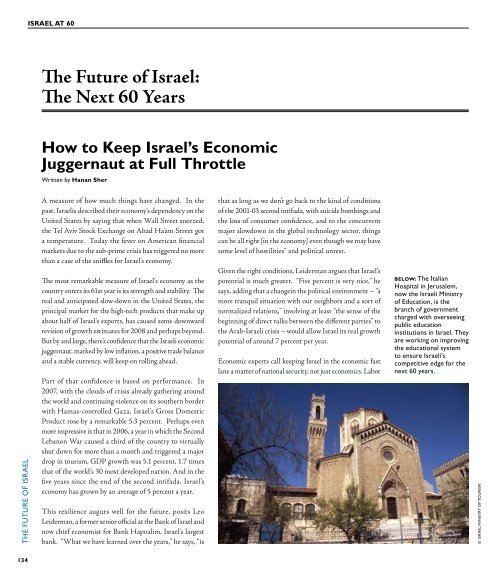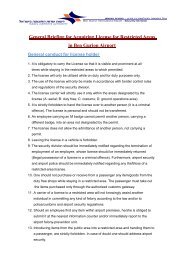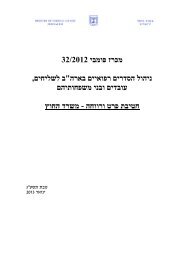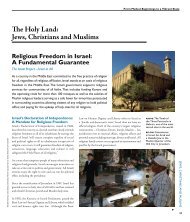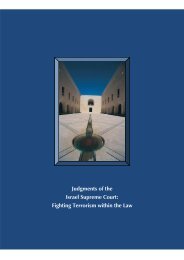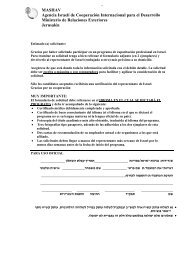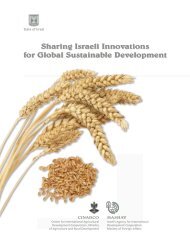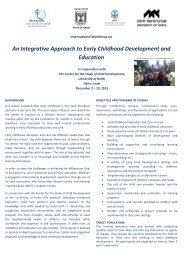The Future of Israel - Israel Ministry of Foreign Affairs
The Future of Israel - Israel Ministry of Foreign Affairs
The Future of Israel - Israel Ministry of Foreign Affairs
- No tags were found...
Create successful ePaper yourself
Turn your PDF publications into a flip-book with our unique Google optimized e-Paper software.
ISRAEL AT 60<strong>The</strong> <strong>Future</strong> <strong>of</strong> <strong>Israel</strong>:<strong>The</strong> Next 60 YearsHow to Keep <strong>Israel</strong>’s EconomicJuggernaut at Full ThrottleWritten by Hanan Sherthe future <strong>of</strong> israelA measure <strong>of</strong> how much things have changed. In thepast, <strong>Israel</strong>is described their economy’s dependency on theUnited States by saying that when Wall Street sneezed,the Tel Aviv Stock Exchange on Ahad Ha’am Street gota temperature. Today the fever on American financialmarkets due to the sub-prime crisis has triggered no morethan a case <strong>of</strong> the sniffles for <strong>Israel</strong>’s economy.<strong>The</strong> most remarkable measure <strong>of</strong> <strong>Israel</strong>’s economy as thecountry enters its 61st year is its strength and stability. <strong>The</strong>real and anticipated slow-down in the United States, theprincipal market for the high-tech products that make upabout half <strong>of</strong> <strong>Israel</strong>’s exports, has caused some downwardrevision <strong>of</strong> growth estimates for 2008 and perhaps beyond.But by and large, there’s confidence that the <strong>Israel</strong>i economicjuggernaut, marked by low inflation, a positive trade balanceand a stable currency, will keep on rolling ahead.Part <strong>of</strong> that confidence is based on performance. In2007, with the clouds <strong>of</strong> crisis already gathering aroundthe world and continuing violence on its southern borderwith Hamas-controlled Gaza, <strong>Israel</strong>’s Gross DomesticProduct rose by a remarkable 5.3 percent. Perhaps evenmore impressive is that in 2006, a year in which the SecondLebanon War caused a third <strong>of</strong> the country to virtuallyshut down for more than a month and triggered a majordrop in tourism, GDP growth was 5.1 percent, 1.7 timesthat <strong>of</strong> the world’s 30 most developed nation. And in thefive years since the end <strong>of</strong> the second intifada, <strong>Israel</strong>’seconomy has grown by an average <strong>of</strong> 5 percent a year.This resilience augurs well for the future, posits LeoLeiderman, a former senior <strong>of</strong>ficial at the Bank <strong>of</strong> <strong>Israel</strong> andnow chief economist for Bank Hapoalim, <strong>Israel</strong>’s largestbank. “What we have learned over the years,” he says, “isthat as long as we don’t go back to the kind <strong>of</strong> conditions<strong>of</strong> the 2001-03 second intifada, with suicide bombings andthe loss <strong>of</strong> consumer confidence, and to the concurrentmajor slowdown in the global technology sector, thingscan be all right [in the economy] even though we may havesome level <strong>of</strong> hostilities” and political unrest.Given the right conditions, Leiderman argues that <strong>Israel</strong>’spotential is much greater. “Five percent is very nice,” hesays, adding that a changein the political environment -- “amore tranquil situation with our neighbors and a sort <strong>of</strong>normalized relations,” involving at least “the sense <strong>of</strong> thebeginning <strong>of</strong> direct talks between the different parties” tothe Arab-<strong>Israel</strong>i crisis – would allow <strong>Israel</strong> its real growthpotential <strong>of</strong> around 7 percent per year.Economic experts call keeping <strong>Israel</strong> in the economic fastlane a matter <strong>of</strong> national security, not just economics. Laborbelow: <strong>The</strong> ItalianHospital in Jerusalem,now the <strong>Israel</strong>i <strong>Ministry</strong><strong>of</strong> Education, is thebranch <strong>of</strong> governmentcharged with overseeingpublic educationinstitutions in <strong>Israel</strong>. <strong>The</strong>yare working on improvingthe educational systemto ensure <strong>Israel</strong>i’scompetitive edge for thenext 60 years.© ISRAEL MINISTRY OF TOURISM134
From Modest Beginnings to a Vibrant StateKnesset member Avishay Braverman, a top economist at theWorld Bank in the 1980s, sees it as essential for fulfillingfounding father David Ben-Gurion’s vision <strong>of</strong> <strong>Israel</strong> asa society based on three pillars: excellence, justice andsustainability. He says that Ben-Gurion, who died morethan 30 years ago, would not accept a second-rate economy.“We have the best people, young and older, in the world, andour GDP should be $35,000 per capita as in the prosperousEuropean countries, not the current $25,000.”AMOS BEN GERSHO, © GPO-ISRAEL NATIONAL PHOTO COLLECTIONBraverman, who was president <strong>of</strong> Ben-Gurion University inBeersheba before entering politics in 2006, sees improvingeducation at all levels as an economic priority, and not onlya social one – particularly since much <strong>of</strong> the science onwhich <strong>Israel</strong>’s high-tech rests is based on academic researchdating back a decade and more. He points to the difficultythat <strong>Israel</strong>i universities, largely supported by governmentmoney, have in attracting talented young <strong>Israel</strong>i PhDs tocome back for teaching and research. “<strong>Israel</strong> used to haveone <strong>of</strong> the highest levels <strong>of</strong> investment in education,” notesBraverman. “But in the last decade, we have been verynegligent, by not budgeting enough for higher education.... Today half <strong>of</strong> the senior pr<strong>of</strong>essors at our universitiesare 55 and older. If we don’t do something to change that,and improve the rest <strong>of</strong> the educational system as well, wewill be wasting human capital.”“<strong>The</strong> years ahead will be extremely challenging, becauseglobal competition is going to grow. Look at what the Asiancountries like India and China are spending on universitiesand in support <strong>of</strong> basic research. American universities arefull <strong>of</strong> doctoral students from all over Asia. It’s quite scaryin the sense <strong>of</strong> future competition,” observes Leiderman.Preservation <strong>of</strong> the <strong>Israel</strong>i edge in the most advancedsciences is essential.“Strategically speaking, <strong>Israel</strong>’s place is in the sophisticatedsegment <strong>of</strong> high-tech, based on R&D. This is our hope,”Leiderman says, adding that Asian countries, with lowerlabor costs, have an obvious advantage in “medium-level”high-tech involving manufacturing and assembly.Maintaining that advantage requires high levels <strong>of</strong>investment in R&D, by both the government and privatecompanies. <strong>Israel</strong>i industry “does not live <strong>of</strong>f <strong>of</strong> low-wageproducts,” notes Shraga Brosh, head <strong>of</strong> the ManufacturersAssociation. “We are an economy that works on innovationand technology. If we continue to invest in R&D, thefuture will be clear and positive.”Though high-tech accounts for about 50 percent <strong>of</strong> <strong>Israel</strong>’sexports and is the main engine <strong>of</strong> growth, it provides only asmall percentage <strong>of</strong> jobs. “We have to change the structure<strong>of</strong> <strong>Israel</strong>i industry to accommodate the 90 percent <strong>of</strong> thoseemployed who will not and cannot be in high-tech,” saysBraverman, who like others see places for them in theservices, tourism and construction industries, as well as inindustries that are nominally low-tech in the products theyturn out but may use sophisticated technologies to makethem. One example he gives is father and son Stef and EitanWertheimer’s building <strong>of</strong> Iscar. “<strong>The</strong>y took simple machinetools, blades for cutting, which is essentially a relativelyunsophisticated business, and transformed it from low-techto motek, which means sweet in Hebrew. <strong>The</strong> Wertheimersprove that <strong>Israel</strong> doesn’t have to specialize only in exotictechnologies, like imaging and communications.”above: <strong>The</strong> clothingstalls in Tel Aviv’s CarmelMarket. Increasedeconomic activity willcreate a prosperity thatthe entire economy willbenefit from.Left: Acting PrimeMinister Ehud Olmert(right) receives the 2005<strong>Israel</strong> Bank report fromBank <strong>of</strong> <strong>Israel</strong> GovernorPr<strong>of</strong>fesor Stanley Fischer(left), at the Industry andTrade <strong>Ministry</strong>in Jerusalem.WEBRESOURCEs:<strong>Ministry</strong> <strong>of</strong>Finance:www.m<strong>of</strong>.gov.ilBank <strong>of</strong> <strong>Israel</strong>:www.bankisrael.gov.ilBank HaPoalim:www.bankhapoalim.comManufacturersAssociation <strong>of</strong><strong>Israel</strong>:www.industry.org.il/EngTel Aviv StockExchange:www.tase.co.il➤the next 60 years135
ISRAEL AT 60the future <strong>of</strong> israel<strong>The</strong> Wertheimers sold 80 percent <strong>of</strong> Iscar to U.S. investorWarren Buffett; the $4 billion they received made 2006,the year <strong>of</strong> the sale, the best-ever for foreign investmentin <strong>Israel</strong>. Though 2007 foreign investment, at just over$10 billion, represented a 29 percent decline from 2006’s$13.5 billion, it was still almost double the previous record<strong>of</strong> $5.6 billion, set in 2005.<strong>The</strong> faith <strong>of</strong> Buffett’s Berkshire Hathaway firm in an <strong>Israel</strong>icompany – particularly one located well within Katyusharocket range <strong>of</strong> the Lebanese border – was a ratification<strong>of</strong> the confidence other foreign companies have had overthe years in setting up plants and R&D facilities in thecountry. To keep them coming, there must be incentives,says Brosh, the industrialist. “<strong>The</strong> world is a global village.Everyone compares the benefits <strong>of</strong> investing in one placewith another, why in <strong>Israel</strong> rather than Ireland, why inIreland rather than Italy, and so forth.”While Leiderman agrees that incentives may induceforeigners to build new facilities and companies, heis careful to make a distinction. “Many times, foreigninvestment has been no more than a change <strong>of</strong> ownership,”he says. “If a company like Iscar, for example, leaves thingsas is and does not increase its workforce after someone likeBuffett buys it, basically it has little effect on the economy,even though it is registered as a foreign investment.”Much <strong>of</strong> the success <strong>of</strong> the past five years – which inaddition to 5 percent average annual growth includesa reduction <strong>of</strong> the ratio <strong>of</strong> debt to GDP from over 100percent to last year’s 79 percent, a 2007 government deficit<strong>of</strong> only 0.02 percent <strong>of</strong> GDP, a drop in unemploymentfrom 11 to 7.3 percent, a $5 billion positive trade balanceand a 25 percent increase in tourism to 2.3 millionvisitors last year – has been attributed to a combination<strong>of</strong> budgetary discipline (read budget-cutting) andconservative monetary policy that has held inflation incheck. In practice, that policy has focused on efforts tocontract the bureaucracy so as to free up assets for theproductive private sector, cuts in government servicesincluding health, education and welfare-style transferpayments to large families, the elderly, the handicappedand others, and tax cuts to the top income brackets in theexpectation that they will stimulate increased economicactivity that will create a prosperity that will affect lowerincome brackets, as well. “As the standard <strong>of</strong> living rises,the entire economy will be pulled higher,” says Brosh.“And when the average standard <strong>of</strong> living goes up, theperson who was earning less will earn more.”<strong>The</strong>se policies have, at least in the short term, had anundesired side effect – an increase in poverty rates amongultra-Orthodox Jews and Arabs, two groups in whichworkforce participation is low.6543210Czech RepublicReal GDP Growth 20066.0 6.0 5.3 5.1 4.9 4.0 4.0 3.8 3.4 3.0 2.7 2.7 2.6 2.4 2.2 1.7 1.2TurkeyIreland<strong>Israel</strong>FinlandHungarySwedenSpainUnited StatesDenmarkUnited KingdomBraverman, who sees himself as a European-style socialdemocrat, suggests that this path is an illusion. “<strong>The</strong> idea,called trickle-down theory, is nice on paper,” Barvermansays. “But if you look at all the clinical work <strong>of</strong> economists,it has no empirical base, and the fault you see exposedwhen these polices are implemented is that the rich aregetting richer, the middle class is not benefitting and thepoor are not improving.”Bank <strong>of</strong> <strong>Israel</strong> Governor Stanley Fischer, who also serves aseconomic adviser to Prime Minister Olmert’s government,recognizes the urgency <strong>of</strong> cutting back on poverty in<strong>Israel</strong> – though he notes that one <strong>of</strong> the reasons that therich-poor gap has widened in the last decade is because<strong>of</strong> a prosperity that has made the rich richer, rather thanthe poor becoming poorer. Instead <strong>of</strong> restoring welfarepayments – except in special cases, like the elderly andthose who cannot work for health reasons – he advocateslonger-term fixes, including improved education, enhancedinfrastructure and the elimination <strong>of</strong> bureaucratic hurdlesthat stifle initiative and make doing business exceedinglydifficult. “What the economy cannot afford,” he told <strong>The</strong>Jerusalem Post, “is to let the budget get out <strong>of</strong> control.We will pay a high price in terms <strong>of</strong> higher [international]JapanEuro areaGermanyFranceItalyPortugalsource: <strong>The</strong> <strong>Israel</strong>Economy At a Glance 2007.hanan sherHanan Sher recentlyretired after 40years as an <strong>Israel</strong>ijournalist, for <strong>The</strong>Jerusalem Report (asSenior Editor/Business)and previously <strong>The</strong>Jerusalem Post. Hegrew up in Florida andimmigrated to <strong>Israel</strong>just after the 1967 Six-Day War. Sher and hiswife Sara, who live inJerusalem, havethree children.136
From Modest Beginnings to a Vibrant Stateinterest rates and a loss <strong>of</strong> confidence in the economy andits management if we do that.”Perhaps surprisingly, both banker-economist Leidermanand industrialist Brosh speak with general approval <strong>of</strong>Bank <strong>of</strong> <strong>Israel</strong> Governor Fischer’s March intervention in themoney markets, when the central bank surprised everyoneby reversing a long-standing policy <strong>of</strong> non-interventionby stepping in to purchase dollars when the exchangerate threatened to fall below the psychological barrier <strong>of</strong>NIS 3.40-$1. And in another move widely interpretedas an effort to stabilize the American currency’s priceon <strong>Israel</strong>i forex (foreign exchange) markets, the centralbank later announced that it would purchase $10 billionin greenbacks over the coming two years, ostensibly toincrease <strong>Israel</strong>’s foreign currency reserves.Since the shekel-dollar rates began declining about twoyears earlier, exporters had been complaining bitterlyabout being caught in a trap. On one hand, their dollardenominatedexports were earning them fewer shekels,while their local <strong>Israel</strong> expenses, including labor, remainedthe same. On the other, a seemingly logical attempt toraise prices to cover the currency-related increase inreal costs might push away customers. But Brosh, theexporters’ main spokesman, is all understanding. “<strong>The</strong>decline <strong>of</strong> the dollar over the past two years, by 28 percent,has created a major competitive problem in the world,” hesays. “We cannot ask anyone to do more than Fischer hasdone, he has done everything that we dreamed <strong>of</strong>.” At thesame time, he suggests that the government “do more inthe fiscal area to balance the low dollar exchange rate andexchange production and export.”In the end, though, it will be the market – and not thegovernment or the central bank – that determines the finalshekel-dollar ratio. “<strong>The</strong>se days the exchange rate is marketdependent,” Leiderman says. “And if the world decidesthat <strong>Israel</strong> is a great place to invest, we will see the shekel at3.40 or 3.20-$1, and there will be nothing that the centralbank will be able to do over time to prevent that. In thatsense, a strong currency is the price <strong>of</strong> success.” ◆ISRAEL 15Becoming one <strong>of</strong> the World’s15 Leading NationsWritten by Gidi GrinsteinAt its 60th anniversary, <strong>Israel</strong> needs a new vision whichwill not only guide its priorities and inform its actionsbut will also be relevant to the lives <strong>of</strong> all <strong>Israel</strong>is. Thisis why the ISRAEL 15 Vision, which calls for <strong>Israel</strong> tobecome one <strong>of</strong> the 15 most developed nations within 15years, is so compelling. It requires improving the quality<strong>of</strong> life <strong>of</strong> all citizens.WEBRESOURCEs:Frequently AskedQuestions on theFinancial Crisis andits Implications for<strong>Israel</strong>:www.bankisrael.gov.ilbelow: One key tobecoming a top 15 leadingnation is to improvequality <strong>of</strong> life overall.Jerusalem’s Ben YehudaStreet pedestrain mall,known as Midrachov,is an enjoyable way for<strong>Israel</strong>is to spend their dayand help stimulate theeconomy at the same time.© ISRAEL MINISTRY OF TOURISMCentral banks can intervene on money markets, saysLeiderman, himself a former Bank <strong>of</strong> <strong>Israel</strong> <strong>of</strong>ficial,when they see disorderly behavior on foreign exchangemarkets. <strong>The</strong> March dollar purchases, he says, followed“an assessment that the forex market was behaving inwhat the pr<strong>of</strong>essionals at the Bank <strong>of</strong> <strong>Israel</strong> thought wasa strange way, so the bank bought some <strong>of</strong> the dollarsthat flooded the market.” In the short term, he viewsthis as permissible “but everything we know about othercountries seems to indicate that attempts <strong>of</strong> central banksto force on the market a given trend in the exchangerate sooner or later may not work out and may result inspeculative losses, because some specs will take positionsagainst the central bank.”➤the next 60 years137
ISRAEL AT 60the future <strong>of</strong> israelQuality <strong>of</strong> life is a very elusive issue. Its definition changesby geography. <strong>The</strong> quality <strong>of</strong> life <strong>of</strong> a religious and spiritualperson is different from that <strong>of</strong> a secular business person.Notwithstanding, quality <strong>of</strong> life is also visible and tangible.For example, anyone can tell that the average quality <strong>of</strong> lifein countries like Canada or Australia is higher than inGreece or Spain. Furthermore, although income per capitais an important factor determining quality <strong>of</strong> life, otherpublic goods such as health, education, employment andsocial cohesion play a critical role as well.<strong>Israel</strong>’s growth <strong>of</strong> recent years can be intoxicating.However, we <strong>of</strong>ten tend to forget that the world economyhas experienced significant growth, as well, in recent years.Hence, impressive rates <strong>of</strong> growth notwithstanding, <strong>Israel</strong>didn’t succeed in leapfrogging – i.e. in catching up withthe leading nations <strong>of</strong> the world.In contrast, during the first 20 years <strong>of</strong> the State, <strong>Israel</strong>’seconomy bounced upward. <strong>Israel</strong> doubled its well-beingrelative to the United States, starting with an averageincome <strong>of</strong> 30 percent <strong>of</strong> the U.S. average and reaching 60percent by the early ’70s. Since then, <strong>Israel</strong> has not beenable to bridge the gaps with the richer countries, whileother countries such as Ireland, Singapore and SouthKorea have made leaps ahead.<strong>The</strong> importance <strong>of</strong> closing the gaps with the richestnations stems from the mobility <strong>of</strong> people, technology andinvestment. <strong>The</strong>se highly mobile resources “choose” whichcountry to go to. Consequently, nations compete for them.Success in this fierce battle is essential for the future <strong>of</strong> anycountry but is critical for the survival <strong>of</strong> <strong>Israel</strong>.<strong>Israel</strong> suffers from the largest gap between the level <strong>of</strong>talent <strong>of</strong> its population and the quality <strong>of</strong> life that it <strong>of</strong>fersits residents. <strong>Israel</strong> is currently ranked 28th in the worldin quality <strong>of</strong> life. Yet, our population is one <strong>of</strong> the mosteducated and technologically savvy in the world. Indeed,<strong>Israel</strong> is a leading exporter <strong>of</strong> talent with one <strong>of</strong> the highestlevels <strong>of</strong> brain drain among developed nations.Becoming one <strong>of</strong> the 15 leading nations – roughly at thelevel <strong>of</strong> Holland, Singapore or New Zealand – requiresleapfrogging our socioeconomic performance and growingat an annual pace <strong>of</strong> 7 to 8 percent for at least 10 years.This is a national challenge that will require widespreadmobilization <strong>of</strong> the key sectors <strong>of</strong> society.<strong>The</strong> phenomenon <strong>of</strong> leapfrogging is different than growth.While the world has established a recipe for stability andgrowth in the form <strong>of</strong> a set <strong>of</strong> accepted principles knownas the “Washington Consensus,” which primarily callsfor fiscal and monetary discipline and privatization, thereis no such recipe for leapfrogging. In other words, eachcountry charts its own path.However, the common denominator among the countriesthat have leaped ahead has been their agenda. <strong>The</strong>y allestablished an ambitious vision, identified growth enginesand exhausted them, benchmarked their performance toother countries, improved the capacity <strong>of</strong> their governmentto make decisions and implement them, enhancedcollaboration among key sectors <strong>of</strong> society and investedin human capital.In addition, nations that leaped ahead contained theirunique challenge and tapped into their individualpotential. For example, Singapore understood that itwas located at a junction between East and West andtherefore developed the world’s leading airport, seaportand airline, while Ireland tapped the benefits <strong>of</strong> itsinclusion into the EU.We also know that leapfrog happens as a consequence<strong>of</strong> a combination between top-down leadership by thegovernment and bottom-up mobilization <strong>of</strong> the key sectors<strong>of</strong> society. Hence, on the one hand, reforming <strong>Israel</strong>igovernance is key since it is significantly underperformingcompared to our business sector. At the same time, we haveto find ways to harness mayors and local governments,businesspeople, philanthropists, nonpr<strong>of</strong>its and worldJewry to the ISRAEL 15 Vision and create the space thatallows them to make a contribution as well.Finally, growth and development have to turn into a“national obsession.” We have had such passions inthe past: greening the desert, redeeming the land orimmigration absorption. <strong>The</strong> challenge for the ISRAEL15 Vision is to become a household phrase and aframework that inspires for action.<strong>The</strong> ISRAEL 15 Vision may be ambitious, but it isattainable. Already today <strong>Israel</strong> is a world leader in keyareas such as research and development, human capitaland technology. We have outperformed expectations inthe past. <strong>The</strong>re is no reason we cannot do it again. ◆Gidi grinsteinGidi Grinstein isfounder and president<strong>of</strong> the Reut Institute.This article is basedon a speech given byGrinstein at the 2008Herzliya conference.above: <strong>The</strong> K<strong>of</strong>flerAccelerator at night.WEBRESOURCEs:Reut Institute:reut-institute.orgInstitute forPolicy andStrategy-HerzliyaConference:www.herzliyaconference.org/Eng138
From Modest Beginnings to a Vibrant StateFrom Curiosityto ExcellenceWritten by Pr<strong>of</strong>fesor Daniel Zajfman, President <strong>of</strong> theWeizmann Institute <strong>of</strong> Science© WEIZMANN INSTITUTE; KLUGER ZOLTAN, © GPO-ISRAEL NATIONAL PHOTO COLLECTIONExcellence is a concept that many espouse but few canreally define. When we meet up with excellence, werecognize it immediately, even as we struggle to pinpointthe quality that separates the excellent from the rest. Part<strong>of</strong> our difficulty is that excellence is revealed differentlyin different areas <strong>of</strong> human activity: An athlete who winsOlympic medals, an airline that provides outstandingservice and a scientist whose breakthrough discovery earnsa Nobel Prize – each is excellent in their own milieu. Butwhat do they have in common?Investigating the roots <strong>of</strong> this attribute we call “excellence,”we might discover that it’s really a way <strong>of</strong> life. <strong>The</strong> basictrait shared by all those who aspire to excellence is aninternal drive, a constant striving for perfection that is,in most cases, unattainable. In other words, excellence isa way <strong>of</strong> life that leaves those who choose it in a state <strong>of</strong>perpetual dissatisfaction.<strong>The</strong> excellent sprinter competing in a 100-meter raceknows that a world record can be topped tomorrow. <strong>The</strong>management <strong>of</strong> the excellent airline knows that its specialextras will soon become industry standards, forcing themto redouble their efforts to maintain their top position.<strong>The</strong> excellent scientist knows that every new discovery ortheory will shortly be replaced by even newer findings.My personal experience <strong>of</strong> excellence comes from theWeizmann Institute <strong>of</strong> Science and its contributionto the technological, economic and educational wellbeing<strong>of</strong> <strong>Israel</strong>, and so I will focus my remarks on thisarea. <strong>The</strong> Weizmann Institute <strong>of</strong> Science is a researchinstitute in which about 400 scientists, supported by astaff <strong>of</strong> some 2,200, conduct research in the exact andnatural sciences: mathematics, computer science, physics,chemistry, biochemistry and biology. <strong>The</strong> Institute, as anorganization, knows how to cultivate excellence: Two <strong>of</strong>the necessary ingredients are freedom and an open mind,and the Institute is adept at providing one and nurturingthe other. Along with providing the necessary scientificinfrastructure, it gives scientists the liberty to managetheir research independently, with no demands other thanthose <strong>of</strong> their own curiosity. In some sense, the excellence<strong>of</strong> their research is directly linked to the extent to whichwe allow them the freedom to think outside the box.This freedom – usually referred to as “academic freedom”– stems from an understanding that the paths to scientificbreakthrough run through a setting in which scientistshave carte blanche to search for answers to the questionsthat gnaw at their minds. Experience teaches us thatengaging in a relentless attempt to satisfy their curiositycan bring scientists to the very frontiers <strong>of</strong> the known –thereby expanding the bounds <strong>of</strong> human knowledge. Thisis how they attain excellence.<strong>The</strong> Weizmann Institute strategy was developedover many years. It begins with the astute selection<strong>of</strong> promising new scientists, a tactic that has led tooutstanding results throughout the Institute’s history.For example, in 1954, Institute scientists built thecountry’s first computer – in fact, one <strong>of</strong> the first inthe world. In those days,<strong>Israel</strong> was hard-pressedto feed its population, butthose scientists managedto gather together theresources needed tobuild the computer. Atthe Weizmann Institute,they gave us a computerrather than searching forimmediate solutions tothe woes <strong>of</strong> the day. <strong>The</strong>Institute scientists thenAbove: <strong>The</strong> Jubilee Plazaand K<strong>of</strong>fler Accelerator<strong>of</strong> the Canada Centre <strong>of</strong>Nuclear Physics.bottom: Pr<strong>of</strong>esor ChaimWeizmann presentinga diploma during thegraduation ceremony.➤the next 60 years139
ISRAEL AT 60generates new knowledge– the hard currency <strong>of</strong>excellence.the future <strong>of</strong> israelused the new computer to calculate the position <strong>of</strong> theworld’s amphidromes – points in the ocean that neverexperience tides.<strong>The</strong> cost <strong>of</strong> constructing that computer, which theynamed WEIZAC, was huge, especially given themeager financial resources <strong>of</strong> the Institute at that time.But someone here understood that a computer used fortheoretical, “non-applicable” research (what immediatebenefits might result from knowing the exact tide-lesspoints in the oceans?) had the potential to change thefuture for all <strong>of</strong> us. <strong>The</strong> project ultimately led to theestablishment <strong>of</strong> the first academic department <strong>of</strong>computer science in <strong>Israel</strong>, and this department becamethe basis <strong>of</strong> the country’s entire computing industry.How did this happen? How did theoretical research,with no practical application whatsoever, come to shapethe face <strong>of</strong> our society and our economy? It happenedbecause, in the pursuit <strong>of</strong> excellence, the subjectmatter – locating amphidromes for example – is notwhat counts. It’s the people that count. Behind thecomputer construction project were people with a thirstfor knowledge and a nagging dissatisfaction with thealready known. <strong>The</strong>se qualities drove them to embarkon a highly complicated project (building a computer)and thus to take the first step in laying the foundationsfor an advanced, knowledge-based high-tech industry– today the pride <strong>of</strong> the whole country. <strong>The</strong> way toexcellence begins with human curiosity. When theyearning to reach beyond present understanding turnsthat curiosity into a real thirst for knowledge, it fuelsnew invention and discovery. Curiosity, therefore,How, then, can wesafeguard the impetusborn <strong>of</strong> our curiosity?Preserve the high level <strong>of</strong>academic research in <strong>Israel</strong>?Ensure that the WeizmannInstitute <strong>of</strong> Science and theother excellent universitiesin <strong>Israel</strong> will continue toprovide the high-qualityhuman resources neededto shape the country’s future? <strong>Israel</strong>’s current economicoutlook is increasingly based on knowledge (ideas) ratherthan on tangible products. In fact, trends show thatintellectual property (really great ideas) is rising in value,in comparison with natural resources (even oil). <strong>The</strong> key tosuccess is the Weizmann Institute formula: Give universitiesboth the means and the freedom to attain the intellectualbreakthroughs <strong>of</strong> the future. We must remember thatwhat appears today to be basic academic research can leadto the development <strong>of</strong> advanced industrial applications todrive tomorrow’s economy. <strong>The</strong> bottom line, then: It makeseconomic sense to invest in research and education. True,it’s expensive, but it carries almost no risk. If past experiencecan be our guide, it’s the best investment possible – one thatwill yield a future we can’t yet even imagine. And if a brightfuture is what we aspire to – well, we won’t be able to createit in any other way. ◆pr<strong>of</strong>essordaniel zaifmanIn December, 2006,Pr<strong>of</strong>fesor DanielZajfman was electedto be the tenth (andyoungest) president<strong>of</strong> the WeizmannInstitute. In 1989 hereceived a Ph.D. inatomic physics fromthe Technion, in Haifa.He then completedpost-doctoral researchat the ArgonneNational Laboratorynear Chicago.WEBRESOURCEs:WeizmannInstitute <strong>of</strong>Science:www.weizmann.ac.ilAbove left: Dr. VladimirY. Umansky works at<strong>The</strong> Joseph H. and BelleR. Braun Center forSubmicron Research inthe Condensed MatterPhysics Department.Left: Pr<strong>of</strong>essor YoramSalomon (left) worksin the department <strong>of</strong>Biological Regulation andPr<strong>of</strong>essor Avigdor Scherz,a frequent collaborator,works in the department<strong>of</strong> Plant Sciences.© WEIZMANN INSTITUTE140
From Modest Beginnings to a Vibrant State<strong>The</strong> Importance <strong>of</strong> Zionism<strong>Israel</strong> and the Jewish People in the 21st CenturyWritten by Gil Troy© GPO-ISRAEL NATIONAL PHOTO COLLECTIONWhile celebrating the miracle <strong>of</strong> <strong>Israel</strong> as a thriving,sovereign state for 60 years, some believe it is time toproclaim the end <strong>of</strong> Zionism. Even many who are not hostileto Zionism believe it has run its course, having achievedits main objective by establishing a Jewish state. ShouldZionism be thanked and given a gold watch even before itsgreatest creation <strong>Israel</strong> reaches mandatory retirement age?In fact, <strong>Israel</strong> – and world Jewry – needs Zionism morethan ever. Zionism is the movement <strong>of</strong> Jewish nationalliberation. And in this challenging 21st century, the Jewsstill need liberating, be it in North America, <strong>Israel</strong>, or therest <strong>of</strong> the world.Zionism has two important dimensions. It defines whowe are and suggests what we need to do. As the movement<strong>of</strong> Jewish nationalism, Zionism emphasizes Judaism’suniqueness. Judaism is not just a religion; the Jews area people – a nation – enjoying a rich, historical past,overlapping multi-dimensional present-day ties, and acommon fate. <strong>The</strong>y share a language, Hebrew, a worldview,Judaism, and a traditional homeland, <strong>Israel</strong>.Judaism, one <strong>of</strong> my teachers taught me, is an Oreo cookie.Just as Oreos need the cookie and the cream to be Oreos,Judaism is both a nation and a religion. Consider <strong>Israel</strong>– both Holy Land and sovereign state. Consider Pesach(Passover) – a religious moment <strong>of</strong> deliverance and acritical step in nation building. Consider the Bible itself– a book <strong>of</strong> theology and the story <strong>of</strong> our people.Appreciating Jewish civilization’s national aspects, thispeoplehood thing, explains many mysteries about beingJewish. It explains how even non-believers can be deeplyinvolved in Jewish affairs. It explains how Jews who have neverbeen in <strong>Israel</strong>, can feel assaulted when a bomb rips througha pizzeria in Jerusalem or a cafe in Tel Aviv. It explains how<strong>Israel</strong>is – helped by world Jewry -- can take responsibility forresettling 850,000 Jews expelled from Arab lands, a millionRussian Jews and tens <strong>of</strong> thousands <strong>of</strong> Ethiopians. And itexplains all the cultural, national, non-religious pieces <strong>of</strong> ourown particular Jewish puzzles we each fill in daily.Zionism teaches that thisnational identity cannot bestatic or passive. We shouldnot just be Jewish, weshould do Jewish. And weshould not just do Jewish toentertain ourselves, or findspiritual meaning alone,but to help each other asJews and as human beings.Zionism, at its best, likeall great nationalisms, isa movement <strong>of</strong> nationalself-protection that canmobilize masses to makethe world a better place,what we Jews call tikunolam. So Zionism is about individuals finding greatermeaning by identifying with historical and forward-lookingforces greater than themselves through collective efforts asJews. Zionism is about fighting anti-Semitism and helpingto resettle refugees from Darfur, in <strong>Israel</strong> and elsewhere.Zionism is about improving <strong>Israel</strong>’s quality <strong>of</strong> life andexporting life-saving technology around the world. Zionismis about critiquing the world as it is, dreaming about how itshould be and doing our best together to fix it.<strong>The</strong>se visions should animate a Jewish national agenda forthe next 60 years, focusing on Crisis Zionism, IdentityZionism and <strong>Israel</strong>i Zionism as a special case.CRISIS ZIONISM:We cannot forget the initial Zionist impulse -- towardself-defense. And if we did, our enemies would remindus. Just as the continuing Arab onslaught against <strong>Israel</strong>demands vigilance that <strong>of</strong>ten raises Zionist consciousness,the renewed epidemic <strong>of</strong> anti-Semitism returns Zionismto its roots and reaffirms the importance <strong>of</strong> having a Jewishstate in this occasionally hostile world. <strong>The</strong> state <strong>of</strong> <strong>Israel</strong> ismodern Jewry’s most powerful ally against anti-Semitism,with sovereign leaders who can lobby other state leadersto control outbursts in problematic countries, with aabove: <strong>The</strong>odor Herzlon the balcony <strong>of</strong> thethree kings hotel in Baselin 1898 during the firstZionist Congress.WEBRESOURCEs:World ZionistOrganization forYoung Adults:www.hagshama.org.ilJewish Agency-Zionist Education:www.jewishagency.orgHadassah-Women’s ZionistOrganization:www.hadassah.orgBirthright <strong>Israel</strong>:www.birthrightisrael.com➤the next 60 years141
ISRAEL AT 60legendary army whose deterrent effect is important andwith the ability, if necessary, to rescue and absorb any newJewish refugees. <strong>The</strong> once stateless, friendless Jews havetheir own state, their own champion – and have greatlybenefited from the association.IDENTITY ZIONISM:Zionism is more than responding to crises and rescuingJews; it is also about dreaming, about creating a New Jewshaping an exciting Jewish future. This identity Zionismmay be most useful where it is least welcomed – in NorthAmerica today. Despite the surveys showing a growingdistance between American Jews and <strong>Israel</strong>, despite thestudies claiming America has become “post-ethnic,” thenotion <strong>of</strong> Jewish peoplehood remains the essential gluekeeping the American Jewish community together andlinking American Jews to their heritage. With barely 13percent <strong>of</strong> the American Jewish community defining itselfas religious, the Zionist emphasis on peoplehood explainswhy American Jews remain Jewish. In fact, throughout theWest, Identity Zionism can unite religiously motivatedJews with more culturally or nationally motivated Jews.<strong>The</strong> central challenges facing most people in modernconsumerist democratic societies – and especially Jews –have more to do with identity than survival. Living amidWestern freedoms, riches and technological miracles, most<strong>of</strong> us seek anchors, guideposts, ways to make sense <strong>of</strong> life.Zionism can provide the ideological framework, communalvision and enduring values we desperately need. So manyJews from across the religious spectrum share that sense <strong>of</strong>identification, <strong>of</strong> pride in fellow Jews, <strong>of</strong> instant intimacywith fellow Jews, <strong>of</strong> specialfamiliarity regardingJewish traits. Zionismmakes our tribalismtranscendent, shaping oursense <strong>of</strong> connection into acommunal quest filled withenduring values, orientedtoward constructive andcommon dreams.In building this nationalidentity, <strong>Israel</strong>, as theslogan says, “Is real;” itfleshes out this peoplehoodthing. In good times, and bad, <strong>Israel</strong> raises Jewishconsciousness, and provides a stage with a rich Jewishsetting for writing and updating the ongoing Jewish script.Studies show that modern acculturated Jews respond to24/7 Jewish experiences. <strong>Israel</strong> is the ultimate 24/7 Jewishexperience, following Jewish time, living in a Jewish space,implementing Jewish values, improvising a modern Jewishlife. In particular in the United States, as Jews grow furtheraway from the immigrant experiences and the “old country,”<strong>Israel</strong> has an important role to play as both the “old” and“new” country. <strong>Israel</strong>i foods, songs, stories, images, customs,accents can restock the American Jewish imagination asmemories <strong>of</strong> Eastern European Jewish life dim. <strong>Israel</strong>can become an important source <strong>of</strong> new experiences andan important laboratory for generating new Jewish ideas,perfecting new Jewish forms, tapping new Jewish energiesand pioneering new Jewish solutions to the real problems<strong>of</strong> running a state.Above: <strong>The</strong> Mt. Scopuscampus at the HebrewUniversity <strong>of</strong> Jerusalem.Hebrew study is the keyto stronger Zionism andJudaism in <strong>Israel</strong>.left: Father and sonpray and reflect atthe Western Wall inJerusalem. Zionismteaches one to findgreater meaning throughhistorical and forwardlookingforces that aregreater than themselves.the future <strong>of</strong> israelTwo simple solutions could trigger the kind <strong>of</strong> Zionistrevival needed to revitalize modern Diaspora Jewry. Forstarters, we need more Hebrew study. Hebrew is the keyto unlocking prayer, the gateway to Jewish religious life,and <strong>Israel</strong> is the gateway to a rich, real, Jewish national life.Rather than retreating from Hebrew study, Jewish parentsshould embrace the multilingual trends <strong>of</strong> this globalizedworld and make sure their children achieve Hebrew fluency.Second, we must build on the great success <strong>of</strong> birthright<strong>Israel</strong> and remember the formula 2DW=1il. For mostNorth American Jews, two trips to Disney World roughlyequal the cost <strong>of</strong> one <strong>Israel</strong> trip. <strong>The</strong> more Diaspora Jewsvisit <strong>Israel</strong>, the more time Jews spend in <strong>Israel</strong>, the strongerboth Zionism and Judaism will be.gil troyGil Troy is Pr<strong>of</strong>essor<strong>of</strong> History at McGillUniversity in Montrealand a Visiting Scholaraffiliated with theBipartisan PolicyCenter in Washington.Troy is also the author<strong>of</strong> Why I Am a Zionist:<strong>Israel</strong>, Jewish Identityand the Challenges<strong>of</strong> Today.© ISRAEL MINISTRY OF TOURISM142
From Modest Beginnings to a Vibrant State© ISRAEL MINISTRY OF TOURISMISRAELI ZIONISMAs <strong>Israel</strong> reaches middle-age, a renewed Identity Zionismcould help solve the country’s mid-life crisis. As <strong>Israel</strong>i Jewsbecome Americanized, they suffer more and more fromthe excessive materialism, alienation, individuation, apathyand loneliness that afflict so many moderns in advanced,consumerist society. Already, many <strong>Israel</strong>is complain <strong>of</strong>a values crisis, lamenting too much corruption, greedand selfishness, at all levels <strong>of</strong> society. <strong>The</strong> Zionism <strong>of</strong>the kibbutz and the Jaffa orange may be more suited tomuseums; these days, it is hard to jump up and down,doing the circle dances <strong>of</strong> yesteryear, without sending yourcell phones, iPods, Blackberries and car keys flying. Butthe us <strong>of</strong> Zionism can counterbalance the I <strong>of</strong> modernityin Tel Aviv, as well as in New York. Zionist dreams canneutralize post-modern cynicism; Zionist social activismcan help cure the computer age’s couch-potato passivity.Having helped make so much <strong>of</strong> the desert green,Zionism has to help stop the modern <strong>Israel</strong>i from feelingso blue. Instead <strong>of</strong> draining swamps, there is pollutedair to clean and far too much litter to pick up. Instead<strong>of</strong> broken refugees to resettle, there are the poor t<strong>of</strong>eed, the uneducated to teach, those broken by moderndysfunctions to heal. Instead <strong>of</strong> jumpstarting a culture, asociety, an economy and a political system, there are thesystems <strong>of</strong> a modern country waiting for their 60-yearcheck-up and, in some cases, a serious overhaul. Zionismwas never just about getting to <strong>Israel</strong> or surviving; it wasabout perfecting this new country and thriving. For all <strong>of</strong><strong>Israel</strong>’s tremendous accomplishments these last 60 years– many thanks to Zionism – a renewed Zionism will tapa forward-thinking, altruistic, idealistic, creative sense <strong>of</strong>community for the next 600 years.True, so many <strong>of</strong> these lovely sentiments would be muchmore compelling, and easier to address, without theconstant security challenges <strong>Israel</strong> has been forced to face.But we cannot let the continuing threats against <strong>Israel</strong> robZionism <strong>of</strong> its idealism – and its transformative potential.Abandoning Zionist dreams amid sobering realities – orlimiting Zionist activism to Jewish self-defense – givesour enemies a victory they do not deserve. A centuryago, <strong>The</strong>odor Herzl, the modern founder <strong>of</strong> this old-newmovement taught us: “Im Tirzu, ayn zo agaddah.” (If youwill it, it is no dream.) Today, we still need to dream – andstill need to show just how <strong>of</strong>ten we can transform thedreams <strong>of</strong> today into the triumphs <strong>of</strong> tomorrow. ◆Above: American-Jewsvisit a camel ranch inEilat. It is important tobuild on the great success<strong>of</strong> birthright <strong>Israel</strong> andhave Jews from all overthe world visit <strong>Israel</strong>.WEBRESOURCEs:<strong>The</strong> Jewish PeoplePolicy PlanningInstitute:www.jpppi.org.il<strong>Israel</strong>i PresidentialConference 2009:http://presidentconf.themarker.comConference<strong>of</strong> Presidents<strong>of</strong> MayorAmerican JewishOrganizations:www.conference<strong>of</strong>presidents.orgUnited JewishCommunities- <strong>The</strong>Federation <strong>of</strong>North America:www.ujc.orgRelations Between<strong>Israel</strong>i and AmericanJewry: A RealisticVisionWritten by Pr<strong>of</strong>essor Yehezkel Dror, Founding President <strong>of</strong><strong>The</strong> Jewish People Planning InstituteRelations between American Jewry and <strong>Israel</strong> duringthe first 60 years <strong>of</strong> <strong>Israel</strong>’s existence have by and largedeveloped into a great success, to the benefit <strong>of</strong> all.However, achievements in the past do not automaticallyguarantee future success in a rapidly changing world,where clinging to what has worked in the past <strong>of</strong>tenassures failure in the future.This applies, first <strong>of</strong> all, to U.S.-<strong>Israel</strong>i relations as a whole.While excellent cooperation between American Jewryand <strong>Israel</strong> facilitates these relations, this relationship inturn depends on them. American Jews are committedU.S. citizens. Thus, they support U.S. policies that intheir view benefit both America and <strong>Israel</strong>. <strong>The</strong>refore,<strong>Israel</strong> – in cooperation with American Jewry-- has towork hard at maintaining and strengthening its specialrelationship with the United States, as it is essential forits relations with American Jewry, in addition to othercritical considerations.Moving to intra-Jewish considerations in the United States,generational changes are increasingly raising difficultissues. <strong>The</strong> new generation shares less and less the deep➤the next 60 years143
ISRAEL AT 60emotional experiences <strong>of</strong> the Shoah, the establishment<strong>of</strong> <strong>Israel</strong> and its struggle for survival, which for themis “history” rather than a formative experience. Also,the scope <strong>of</strong> shared campaigns such as “Let My PeopleGo” from the Soviet Union, has become more limited.And post-modern values attractive to many young Jews,compounded with a lack <strong>of</strong> understanding <strong>of</strong> MiddleEastern realities, can undermine support for <strong>Israel</strong> as aJewish State, as well as its policies.In <strong>Israel</strong>, the younger non-Orthodox generation regardsitself increasingly as “<strong>Israel</strong>i” first and only secondarily asJews. Many <strong>Israel</strong>is know all too little about AmericanJewry. And many <strong>Israel</strong>i policies, such as assigningsecondary status to main American Jewish religiousstreams, harm relations. Also, some <strong>Israel</strong>i realitiestarnish <strong>Israel</strong>’s image as a just and high-quality country,imperiling its standing among American Jews, especiallyin the younger generation.If the quite radical differences between the subjectiveexperiences and the objective realities <strong>of</strong> being a Jew ina Jewish State and being a Jew in the United States areadded to the outlook, the unavoidable conclusion is thatunless <strong>Israel</strong>i-U.S. Jewry relations are restructured on somenovel foundations, their future may be bleak. However, athriving future is possible as illustrated by the followingrealistic vision for the next 60 years:• <strong>Israel</strong> recognizes the legitimacy <strong>of</strong> Jews living in theDiaspora and accepts them, and especially AmericanJewry, as full partners sharing responsibility for the future<strong>of</strong> the Jewish People as a whole.pressing predicaments, such as large scale assimilation.• American Jews better understand the realities facing<strong>Israel</strong> in the Middle East, with special attention to theyounger generation so it is not carried away by anti-<strong>Israel</strong>i“new age” ideas.• American Jewry increases its moral, political and materialsupport for <strong>Israel</strong>, understanding that <strong>Israel</strong> cannot shoulderalone the continuous burdens and challenges <strong>of</strong> building(and defending) a Jewish State in the Middle East.• U.S. Jewry and <strong>Israel</strong> cooperate in developing newpatterns <strong>of</strong> “multiple residence,” as fitting globalization andpartly in place <strong>of</strong> diminishing full Aliya, with an increasingnumber <strong>of</strong> Jews dividing their time between the U.S. and<strong>Israel</strong>, while respecting their citizen duties.• U.S. Jewry and <strong>Israel</strong> engage in joint projects, such asdesigning core curricula on Judaism and the Jewish Peopleto be shared by Jewish schools in both countries; cultivationand development <strong>of</strong> Jewish People leadership and a variety<strong>of</strong> “Tikkun Olam--Mend the World” projects.Such a flourishing future relationship between <strong>Israel</strong>and American Jewry, within the special United States-<strong>Israel</strong> relationship, is definitely possible, and if it comes t<strong>of</strong>ruition, will be <strong>of</strong> much benefit to all. But it is not assured.It does not stretch the imagination too much to constructa plausible nightmare scenario in which deteriorating<strong>Israel</strong>-American Jewry relations have dire consequencesfor both communities within a context <strong>of</strong> serious tensionsarising between the United States and <strong>Israel</strong>.pr<strong>of</strong>essoryehezkel drorPr<strong>of</strong>essor <strong>of</strong> PoliticalScience at theHebrew University<strong>of</strong> Jerusalem, amember <strong>of</strong> the Club<strong>of</strong> Rome, scholarand internationaladvisor on statecraft,governance, andpolicy planning. Heserved as a senior staffmember <strong>of</strong> the RANDCorporation in theUSA; Senior Advisorin the Offices <strong>of</strong> <strong>Israel</strong>iPrime Ministers andMinisters <strong>of</strong> Defense.the future <strong>of</strong> israel• U.S. Jewish organizations and leaders are regularlyconsulted on major <strong>Israel</strong>i decisions that impact Jewry and theJewish People as a whole, such as the future <strong>of</strong> Jerusalem.• <strong>Israel</strong> does not “require” automatic support for all itsactions as a duty <strong>of</strong> American Jewry and is instead wideopen to frank discourse.• <strong>Israel</strong> changes domestic policies which are anathema tolarge parts <strong>of</strong> American Jewry, such as non-recognition <strong>of</strong>main religious streams.• <strong>Israel</strong>i public and leadership understand in-depth the maindynamics <strong>of</strong> American Jewry and tries to help in coping with<strong>The</strong>refore, the 60 year anniversary <strong>of</strong> <strong>Israel</strong> is not only atime for celebrating the heroic achievements <strong>of</strong> the past,but also for working hard to assure continuing progress,prosperity and good will in the future – with the realisticand revitalized vision <strong>of</strong> <strong>Israel</strong>-American Jewry relationsserving as one <strong>of</strong> the policy compasses for doing so. ◆Below: <strong>The</strong> U.S. and<strong>Israel</strong> on the worldmap. Both countries areworking hard towards aprosperous future.144
From Modest Beginnings to a Vibrant State© ISRAEL MINISTRY OF TOURISMWhat <strong>Israel</strong> Meansto meFinal ReflectionsWritten by David A. HarrisI’m sure I am not alone in admitting that I still getgoose bumps when I hear <strong>Israel</strong>’s national anthem,Ha’tikvah (<strong>The</strong> Hope).<strong>The</strong> establishment <strong>of</strong> the state in 1948, the fulfillment <strong>of</strong>its envisioned role as home and haven for Jews from aroundthe world, its wholehearted embrace <strong>of</strong> democracy andthe rule <strong>of</strong> law and its impressive scientific, cultural, andeconomic achievements are accomplishments beyond mywildest imagination.For centuries, Jews around the world prayed for a return toZion. We are the lucky ones who have seen those prayersanswered. I am ever so grateful to witness this mostextraordinary period in Jewish history and sovereignty.No other country has been subjected to such a constantchallenge to its very right to exist, even though the ageoldbiblical, spiritual and physical connection betweenthe Jewish people and the Land <strong>of</strong> <strong>Israel</strong> is unique inthe annals <strong>of</strong> history.No other country has faced such overwhelming oddsagainst its very survival or experienced the same degree <strong>of</strong>never-ending international vilification by too many nationswho slavishly follow the will <strong>of</strong> the energy-rich and morenumerous Arab states, and, in doing so, throw integrityand morality to the wind.Yet, throughout, <strong>Israel</strong>is have never succumbed to afortress mentality, never abandoned their deep yearningfor peace with their neighbors or willingness to takeunprecedented risks to achieve that peace, never lost theirzest for life and never flinched from their determinationto build a vibrant, democratic state.That the blue-and-white flag <strong>of</strong> an independent <strong>Israel</strong>could be planted on this land, to which the Jewish peoplehad been intimately linked since the time <strong>of</strong> Abraham,just three years after the Second World War’s end –and with the support <strong>of</strong> a decisive majority <strong>of</strong> U.N.members at the time – truly boggles the mind.And what’s more, that this tiny community <strong>of</strong> Jews, includingsurvivors <strong>of</strong> the Holocaust who had somehow made their wayto Palestine despite the British blockade, could successfullydefend themselves against the onslaught <strong>of</strong> five Arab standingarmies that launched their attack on <strong>Israel</strong>’s very first day <strong>of</strong>existence is almost beyond imagination.I witnessed firsthand what <strong>Israel</strong>i embassies and consulatesmeant to Jews drawn by the pull <strong>of</strong> Zion or the push <strong>of</strong>hatred. I stood in the courtyard <strong>of</strong> the <strong>Israel</strong>i embassyin Moscow and saw thousands <strong>of</strong> Jews seeking a quickexit from a Soviet Union in the throes <strong>of</strong> cataclysmicchange, fearful that the change might be in the direction<strong>of</strong> renewed chauvinism and anti-Semitism.Awestruck, I watched as <strong>Israel</strong> never faltered, not even for amoment, in transporting Soviet Jews to the Jewish homeland,even as scud missiles launched from Iraq traumatized thenation in 1991. It says a lot about the conditions they wereleaving behind that these Jews continued to board planes forTel Aviv while missiles were exploding in <strong>Israel</strong>i populationcenters. In fact, on two occasions, I sat in sealed rooms withSoviet Jewish families who had just arrived in <strong>Israel</strong> duringthese missile attacks. Not once did any <strong>of</strong>them question their decision to establishnew lives in the Jewish state. And equally,it says a lot about <strong>Israel</strong> that, amid all thepressing security concerns, it managed,without missing a beat, to continue towelcome these new immigrants.In the mid-1980s, I saw firsthand <strong>Israel</strong>do what no Western, much less Arab,country had ever done before—bring outblack Africans, in this case EthiopianJews, not in chains for exploitation, butin dignity for freedom. <strong>The</strong>se EthiopianJews, numbering tens <strong>of</strong> thousands, hadlived as Jews since the time <strong>of</strong> Solomonand Sheba and had yearned for a returnto Zion ever since. In our lifetimes, theirdreams came true, though the perilousjourney out <strong>of</strong> Ethiopia cost the lives <strong>of</strong>thousands who fell victim to bandits,unforgiving terrain and hunger.above: <strong>Israel</strong> has manygreat cities with state<strong>of</strong>-the-artarchitecturesuch as the GovernmentBuilding in downtownHaifa.below: <strong>The</strong> <strong>Israel</strong>iflag is hung proudly atthe Western Wall inJerusalem.➤the next 60 years145
ISRAEL AT 60the future <strong>of</strong> israelAnd how can I ever forget the surge <strong>of</strong> pride, Jewish pride,that completely enveloped me in July 1976 on hearingthe astonishing news <strong>of</strong> <strong>Israel</strong>’s daring rescue <strong>of</strong> the 106Jewish hostages held by Arab and German terrorists inEntebbe, Uganda, over 2,000 miles from <strong>Israel</strong>’s border?<strong>The</strong> unmistakable message: Jews in danger will neveragain be alone, without hope and totally dependent onothers for their safety.It gives me great pride that the American Jewish Committeewas the first American Jewish organization to open a fulltime<strong>of</strong>fice in Jerusalem, in 1961. Our Project Interchangeprogram, started in 1982, has sent thousands <strong>of</strong> political,civic, ethnic and religious leaders from around the worldon educational seminars in <strong>Israel</strong>, providing them with afirsthand look at the country.<strong>The</strong>re is the tricky and underappreciated issue <strong>of</strong> thepotential clash between the messy realities <strong>of</strong> statehoodand the ideals and faith <strong>of</strong> a people. It is one thing for apeople to live their religion as a minority; it is quite anotherto exercise sovereignty as the majority population whileremaining true to one’s ethical standards. Inevitably,tension will arise between a people’s spiritual or moralself-definition and the exigencies <strong>of</strong> statecraft, between ourhighest concepts <strong>of</strong> human nature and the daily realities <strong>of</strong>individuals in decision-making positions wielding powerand balancing a variety <strong>of</strong> competing interests.In just 60 years, <strong>Israel</strong> has built a thriving democracy,unique in the region, including a Supreme Court prepared,when it deems appropriate, to overrule the prime ministeror the military establishment; a feisty parliament thatincludes every imaginable viewpoint along the politicalspectrum; a robust civil society and a vigorous press.It has built an economy whose per capita GNP exceeds thecombined total <strong>of</strong> its four contiguous sovereign neighbors– Egypt, Jordan, Lebanon and Syria.It has built universities and research centers that havecontributed to advancing the world’s frontiers <strong>of</strong> knowledgein countless ways, including several Nobel Prize winners.It has built one <strong>of</strong> the world’s most powerful militaries –always under civilian control, I might add – to ensure itssurvival in a rough-and-tumble neighborhood. It has shownthe world how a tiny nation can, by sheer ingenuity, will,courage and commitment, defend itself against those whowould destroy it through conventional armies or armies <strong>of</strong>suicide bombers. And it has done all this while striving toadhere to a strict code <strong>of</strong> military conduct that has few rivalsin the democratic world, much less elsewhere – in the face<strong>of</strong> an enemy prepared to send children to the front lines andseek cover in mosques, schools and hospitals.It has built a quality <strong>of</strong> life that ranks it among theworld’s healthiest nations and with an exceptionally highlife expectancy.It has built a thriving culture, whose musicians, writers andartists are admired far beyond <strong>Israel</strong>’s borders. In doing so, ithas lovingly taken an ancient language, Hebrew, the language<strong>of</strong> the prophets, and modernized it to accommodate thevocabulary <strong>of</strong> the contemporary world.It has built a climate <strong>of</strong> respect for other faith groups,including Baha’i, Christianity and Islam, and theirplaces <strong>of</strong> worship. Can any other nation in the areamake the same claim?It has built an agricultural sector that has had much toteach developing nations about turning an arid soil int<strong>of</strong>ields <strong>of</strong> fruits, vegetables, cotton and flowers.Step back from the twists and turns <strong>of</strong> the daily informationoverload coming from the Middle East and consider thesweep <strong>of</strong> the last 60 years. Look at the light-years traveledsince the darkness <strong>of</strong> the Holocaust and marvel at themiracle <strong>of</strong> a decimated people returning to a tiny sliver <strong>of</strong>land and successfully building a modern, vibrant state –against all the odds – on that ancient foundation.In the final analysis, then,the story <strong>of</strong> <strong>Israel</strong> is thewondrous realization <strong>of</strong> a3,500-year link among aland, a faith, a language,a people and a vision. Itis an unparalleled story <strong>of</strong>tenacity and determination,<strong>of</strong> courage and renewal.And it is ultimately ametaphor for the triumph<strong>of</strong> enduring hope over thetemptation <strong>of</strong> despair. ◆david a. harrisDavid A. Harris isExecutive Director<strong>of</strong> the AmericanJewish Committee.WEBRESOURCEs:American JewishCommittee:www.ajc.orgAbove: <strong>The</strong> PoliceOrchestra performs atthe Ben Yehuda Streetpedestrian mall inJerusalem.below: <strong>The</strong> AshdodInternationalFilm Festival.© ISRAEL MINISTRY OF TOURISM146
Boston Hannah International sends itscongratulations to the state <strong>of</strong> <strong>Israel</strong> on theoccasion <strong>of</strong> its 60th anniversary2008Official magazine <strong>of</strong> theAmerican Heart Association’sMidwest AffiliateISRAEL AT SIXTYFrom Modest Beginnings to a Vibrant State1948–2008HEALTHY LIVING WITH HEART DISEASE THE LATEST NEWS ABOUT HEART DISEASEAND STROKE RECIPES FOR A HEALTHY HEART STROKE AND ETHNICITY:WHO IS MOST AT RISK? ADOPT A HEALTHY LIFESTYLE LOBBY DAY 2008OFFICIAL COMMEMORATIVE PUBLICATION • ISRAEL MINISTRY OF FOREIGN AFFAIRSBoston Hannah International is a specialist custom publisher, producinga range <strong>of</strong> consumer, business and anniversary publications and websitesworldwide from <strong>of</strong>fices in USA and EuropeCall in confidence to discuss what we can do for youIf your organization would like to explore the benefi ts and opportunities for a publication <strong>of</strong> your own,please contact Doug Haddad at 312.701.0000www.bostonhannah.com


